|
|
|
Sort Order |
|
|
|
Items / Page
|
|
|
|
|
|
|
| Srl | Item |
| 1 |
ID:
153260
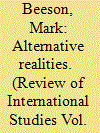

|
|
|
|
|
| Summary/Abstract |
The central argument of this article is that constructivists in particular underestimate or even ignore the importance of the ‘real’ structural inheritance that shapes state (and the political elites that represent them) behaviour. Even though the future is indeterminate, some outcomes are decidedly more likely than others, especially where policymakers believe they inhabit a strategic universe of zero sum outcomes and where self-reliance and assertion remain important. I suggest that ‘critical realism’ offers a way of accounting for the institutional structures that shape international behaviour. The first half of this article makes the case for a critical realist approach. The second half illustrates the possible importance of this claim with reference to the contemporary geopolitics of the Asia-Pacific region.
|
|
|
|
|
|
|
|
|
|
|
|
|
|
|
|
| 2 |
ID:
129563
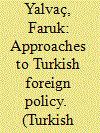

|
|
|
|
|
| Publication |
2014.
|
| Summary/Abstract |
This article analyses different approaches to Turkish foreign policy (TFP) from a critical realist perspective. It seeks to criticize positivist and post-positivist approaches to TFP, arguing for a non-reductionist, historical materialist approach based on the principles of critical realism. It argues that historical materialist approaches are missing both from the analysis of TFP and from the mainstream foreign-policy analysis in general. In emphasizing the importance of a historical materialist approach, the paper also underlines the importance of acknowledging the structural context of foreign policy-making as a complement to the agent-centric, micro-level analyses that dominate the mainstream TFP analysis. Finally, it advocates a research agenda that focuses on the development of a historical materialist approach to TFP.
|
|
|
|
|
|
|
|
|
|
|
|
|
|
|
|
| 3 |
ID:
160885
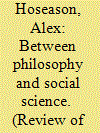

|
|
|
|
|
| Summary/Abstract |
As a discipline, IR returns repeatedly to the ‘problem of harm’; debating what harm is or should mean. Exploring the discipline through this lens allows us to understand it as contributing to a broader process of negotiation centred on harm as a principle of restraint. However, existing accounts of what harm means for IR are challenged by the scale and visibility of large-scale harm. This article attempts to push beyond recent accounts of harm by Linklater and Mitchell by examining their respective framings of the relationship between harm and its explanation in IR. Building on their limitations, I propose a framework centred on arguments for ontological realism and structure as a focus for explanation. The resulting ontology sustains the concerns of both while: (a) more fully characterising the relationship between explanation and values in IR; and (b) providing a more adequate account of the role of abstraction. In developing upon existing accounts, this article seeks to provide a stronger ground for the analysis of harm in IR. More broadly, it contributes to contemporary debates centred on the relationship between ontology and values with a view to clarifying the nature of explanation in IR as a social science.
|
|
|
|
|
|
|
|
|
|
|
|
|
|
|
|
| 4 |
ID:
126631
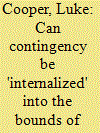

|
|
|
|
|
| Publication |
2013.
|
| Summary/Abstract |
Can general mechanisms governing social life (necessity) and the possibility of multiple outcomes in socio-historical processes (contingency) be incorporated into a single theoretical framework? In recent years, the critical realist philosophy of science has emerged as an intellectual strand within international relations (IR) that makes theoretical claims about necessary social processes while recognizing the irreducible role of contingency. However, critical realist scholars treat contingency as an 'externality', thereby declining to theorize social processes that result in contingent outcomes. Here, it is argued that contingency emerges out of the combination of events and processes as theorized by the law of uneven and combined development. This provides a general conceptualization that treats differentiated historical outcomes, and their contingencies, as inherent to human development. Out of these assumptions a workable approach to historical sociology in IR can be developed-one predicated upon uncovering the form of historical 'combination', the contingent fusion of elements, in international systems.
|
|
|
|
|
|
|
|
|
|
|
|
|
|
|
|
| 5 |
ID:
123590
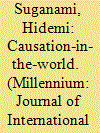

|
|
|
|
|
| Publication |
2013.
|
| Summary/Abstract |
This article examines critical realists' key contention that 'causing', or the operation of causal powers, is real or mind-independent. Against their opponents (causal idealists), they point out the (seeming) empirical obviousness of the mind-independence of causal powers, causal idealism's lack of 'ontological grounding', its 'epistemic fallacy' and so on. The validity or force of such arguments is ultimately dubious, however. Still, the understanding that causal powers are real is a necessary presupposition of scientific knowledge production and application and of our everyday thinking and practice; realists and idealists can converge on this point. Moreover, there is nothing in causal idealism as such that is incompatible with critical realists' key insight that causal laws should be understood as stating the ways things work, producing observable regularities only in closed systems and that regularities are not an intrinsic feature of causal relations. I conclude by exploring the implications of this line of thinking for the study of world politics, endorsing a move from a search for parsimonious theories that explain regular patterns observable in the international system towards a historical study of global social relations, which pays attention to causal complexes, diversity of historical contexts and the contested nature of causal interpretations.
|
|
|
|
|
|
|
|
|
|
|
|
|
|
|
|
| 6 |
ID:
167223
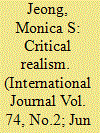

|
|
|
|
|
| Summary/Abstract |
The fundamental problem in middle power scholarship lies in the research design that inadvertently permits bias, tautology, and circularity in the process of realizing the final outcome. Most researchers begin with a presumption that middle powers are countries in the middle range of the world order, capable and willing to play some constructive roles beyond their borders. Thus, they tend to select methods and data compatible with the given presumption, and reach predictable outcomes that determine middle power status by middle power behaviours, or middle power behaviours by middle power status. This is an epistemic fallacy where the ontic category of middle powers is defined by the epistemic knowledge of middle powers. Eventually, any countries with comparable characteristics/behaviours to the given presumption can be classified as “middle powers” conducting middle power behaviours. This article offers critical realism as a much-needed remedy to the stagnant middle power scholarship. It examines a group of countries already categorized as middle powers—Mexico, Indonesia, South Korea, Turkey, and Australia (MIKTA)—under a critical realist framework, and finds that those countries and their activities cannot be generalized by the conventional middle power conception. In fact, the middle power rhetoric itself holds both a positive and negative ideological implication that requires further scrutiny. Yet, what makes the critical realist research design and its findings invaluable is the commitment to ontological realism, epistemological relativism, and judgmental rationalism that addresses the recurring epistemic fallacy. Therefore, the research findings are not merely new insights about “middle power” countries; they are a valid clue that can help uncover the “real” world that causes the so-called “middle power” categorization.
|
|
|
|
|
|
|
|
|
|
|
|
|
|
|
|
| 7 |
ID:
149491
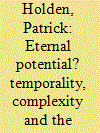

|
|
|
|
|
| Summary/Abstract |
Temporality is a relatively under-explored factor in international relations. The concept of timescape refers to the temporal timeframe of institutional processes and/or the timeframes of causation at different levels. Said concept has powerful explanatory potential in the case of complex, fragmented entities such as the European Union (EU). Critical realism offers a historicist meta-theoretical framework for delineating and analysing timescapes of different forms. Theories of critical political economy and historical sociology can be used to critique the EU’s own liberal teleological timescapes. The Union’s leadership postulates a central future role for it, based on its long-term structural relationships, and its Mediterranean policy is a prime example of this structural foreign policy. However, its component structures are profoundly dissonant and unlikely to coalesce into a meaningful role. The EU’s engagement in the Mediterranean illustrates how its long-term approach is over-ridden by the ‘real-time’ agency of other actors, and by deeper socio-economic cycles which it cannot control. A focus on temporality thus helps to interpret and explain the fragmented power of the EU; as well as our complex international system more generally.
|
|
|
|
|
|
|
|
|
|
|
|
|
|
|
|
| 8 |
ID:
101473
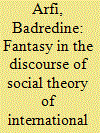

|
|
|
|
|
| Publication |
2010.
|
| Summary/Abstract |
No doubt Wendt's 'Social Theory of International Politics' (STIP) is a discourse. As such, the theory is built on certain discursive conditions of possibility. Drawing on Lacan's theory of discourse, I analyse these conditions of possibility in arguing that a desire of discursive closure is created in STIP through a fantasy. The latter sustains itself not only by pre-empting its own failure but also by maintaining the desire for discursive closure. I argue that STIP cannot escape deploying such a fantasy. More broadly, what social constructivism based on critical realism does, especially in its thin version, is construct a dichotomy between intransitive and transitive objects in its theoretic discourses. It then endeavours, via constructing fantasies, to use transitive discursive objects to sustain the desire for the constructed dichotomies, which hankers for discursive closure. This means that Wendt is more constructivist than he knows, despite his move of 'not going all the way down'. In short, I argue that 'ideas not all the way down' is a discourse all the way down because of what Wendt and thin constructivists struggle to make of it.
|
|
|
|
|
|
|
|
|
|
|
|
|
|
|
|
| 9 |
ID:
160880
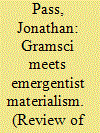

|
|
|
|
|
| Summary/Abstract |
Neo-Gramscians have made invaluable contributions to expanding traditional IR/IPE theory. Nevertheless, as the following article indicates, the ontological, epistemological, and methodological positions they adopt results in a rather one-sided interpretation of Antonio Gramsci and a partial, at times erroneous, account of the nature of the current global system. In highlighting these oversights, the neo neo-Gramscian approach presented here – rooted in a critical realist philosophy of science, specifically ‘emergentist materialism’, and involving a more complete reading of Gramsci – seeks to lay the basis for the elaboration of a more convincing theoretical and conceptual framework to analyse the changing dynamics of contemporary world order, without which the Coxian critical theory dream of engendering social emancipation cannot be fully realised.
|
|
|
|
|
|
|
|
|
|
|
|
|
|
|
|
| 10 |
ID:
187146
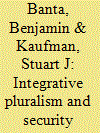

|
|
|
|
|
| Summary/Abstract |
The idea of integrative pluralism offers a promising path for the development of theory in international security and international relations. Instead of either trying to shoehorn all theorising into a single, limited paradigm or giving up entirely on theoretical progress, the integrative pluralist approach calls for bringing diverse approaches together. More precisely, integrative pluralism involves explaining specific phenomena by linking causal processes across multiple layers of reality, and then using the findings to inform broader theoretical constructs such as IR theory paradigms. Elements of the integrative pluralism approach are already visible in the work of mainstream scholars such as Snyder and Katzenstein, as well as of critical scholars such as Sjoberg and Hansen, but the field has tended to overlook these scholars’ efforts at theoretical integration. To more explicitly develop integrative pluralism for our field, this article first draws on critical realist philosophy and social theory. It then illustrates how further steps in this direction might be taken, in particular by highlighting the integrative pluralist aspects of Kaufman's applications of symbolic politics theory to explaining ethnic conflict and war more generally.
|
|
|
|
|
|
|
|
|
|
|
|
|
|
|
|
| 11 |
ID:
163707
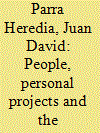

|
|
|
|
|
| Summary/Abstract |
This article makes a critique of using Post-Development as a tool in teaching an introductory course in development studies. Such a debate was initiated by Harcourt in a previous issue of Third World Quarterly as she reflected on her teaching experience in a European Institution. Harcourt concludes that the lack of engagement of some of the students in the course reflects the unwillingness of privileged middle-class pupils to challenge western lifestyles. I draw on a critical realist meta-theory about the process of learning in higher education to challenge the ontological support of that conclusion and invite her to reconsider her teaching strategy.
|
|
|
|
|
|
|
|
|
|
|
|
|
|
|
|
| 12 |
ID:
139300
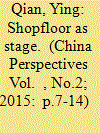

|
|
|
|
|
| Summary/Abstract |
In this paper, I read the play Red Flag Song (1948) as a window into a moment of missed opportunity in China’s revolution, when the Party’s re-engagement with the urban working class could have strengthened democratic tendencies within the Party, and when China’s critical realist literary tradition could have grounded Chinese socialism in the real-life experiences and aspirations of the grassroots. Written at a time when the Party’s control of both industrial and literary productions had begun to tighten, Red Flag Song registered compromise as well as defiance on the shopfloor, and foregrounded two issues as deeply related and fundamental to the making of a New China: work-place democracy as the basis for making China’s working class, and realist literature as a means of understanding complexities and pluralities in social upheavals, and of ensuring a humane and democratic socialism. Unfortunately, the visions Red Flag Song carried were never realised in the following years. They remain unfulfilled promises of the Chinese revolution.
|
|
|
|
|
|
|
|
|
|
|
|
|
|
|
|
| 13 |
ID:
113815
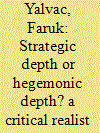

|
|
|
|
|
| Publication |
2012.
|
| Summary/Abstract |
This paper is an attempt to provide a critical realist analysis of the concept of 'strategic depth' recently being used in analysing Turkish foreign policy. The article provides a criticism of the realist geopolitical thinking on which the concept of strategic depth is based using the insights of the critical realist philosophy of science. It takes the concept of ontological depth from critical realism and extends it to Gramsci's analysis and develops the concept of hegemonic depth. Underlying the concept of hegemonic depth is the idea that geopolitical relations should be thought of in connection with the social structures that give rise to them. The article is intended as a contribution to a historical materialist analysis of Turkish foreign policy where a state-centric positivism dominates, as well as an attempt to develop a social theory of foreign policy based on critical realism.
|
|
|
|
|
|
|
|
|
|
|
|
|
|
|
|
| 14 |
ID:
092882
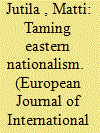

|
|
|
|
|
| Publication |
2009.
|
| Summary/Abstract |
This article uses the logic of explanatory emancipation to criticize post-Cold War minority politics. The main argument is that the ideational background of the double standards of minority protection originates from a contested dichotomy of nationalism that divides nationalisms into Eastern ethnic/malignant nationalism and Western civic/benign nationalism. After presenting the theoretical tradition of the 'Kohn dichotomy', the article traces its use in post-Cold War academic and official policy papers. Through intertextual analysis, this article shows how the old theoretical tradition was recycled into a new context to dispel post-Cold War confusion. This article presents a Critical Realist view on how ideas and theories can be treated as parts of the causal analysis of social practices. With explicitly causal language, identifying possible forms for emancipatory action is easier than with constitutive analyses.
|
|
|
|
|
|
|
|
|
|
|
|
|
|
|
|
| 15 |
ID:
168876
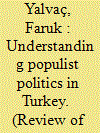

|
|
|
|
|
| Summary/Abstract |
The aim of this article is to understand populism as a hegemonic project involving a struggle for power between different social forces. We take a critical realist approach in defining populism. This implies several things. We develop a new approach to understanding populist politics by taking neither a purely discursive (Laclau), nor a solely structural (Poulantzas), but a critical realist approach and analysing the three-way relationship between structural conditions, agency, and institutional framework. Second, it implies that populist politics is composed of complex and often contradictory dynamics and emergent features involving mainly domestic but also international processes. We develop this through a combination of three concepts – passive revolution, hegemonic depth, and partial hegemony. These indicate how a hegemonic project is situated in deeper social relations and how hegemonic leadership responds to this. We take the policies of AKP government in Turkey as a case in populist hegemonic project. We demonstrate that AKP has followed different hegemonic projects during its rule changing from an initial majoritarian populist politics to one of neoliberal authoritarian populism as it has consolidated its hegemonic depth. These different populist projects involve alternative visions of Turkey but are nevertheless all compatible with a global neoliberal agenda.
|
|
|
|
|
|
|
|
|
|
|
|
|
|
|
|
| 16 |
ID:
121855
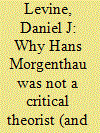

|
|
|
|
|
| Publication |
2013.
|
| Summary/Abstract |
A growing body of critical and reflexive international relations (IR) realism draws on the work of Hans Morgenthau. While not without merit, I argue that these appropriations rely on selective - perhaps even wishful - readings of Morgenthau's work: the reflexivity that he calls for, I argue, is not matched by what his theory actually delivers. Raising that distinction, I then trace out its consequences for contemporary critical and reflexive IR realists, in two steps. First, I identify similar reflexive shortcomings in recent work by neoclassical realist Randall Schweller. These, I suggest, point to abiding challenges to which contemporary critical/reflexive realism must prove itself equal. I then survey the notions of reflexivity at work in the critical/reflexive realism of Michael C. Williams and Richard Ned Lebow. Do they go far enough? Do they answer those challenges? I conclude by arguing that Morgenthau's legacy for critical and reflexive realism should be reconsidered: properly understood, his work signals an impasse that is general to IR as a discipline. Signaling the depth of that impasse constitutes a lasting legacy, with which critical/reflexive realists have not yet dealt adequately.
|
|
|
|
|
|
|
|
|
|
|
|
|
|
|
|
|
|
|
|
|